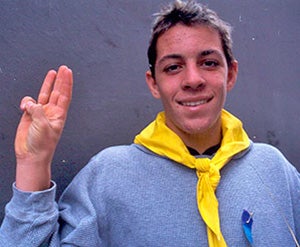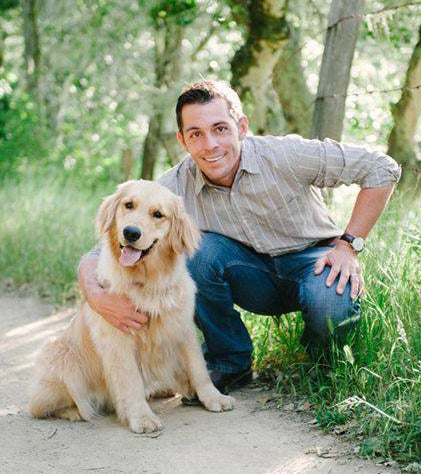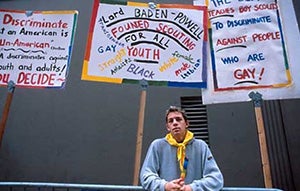FILMMAKER TOM SHEPARD AND ACTIVIST STEVEN COZZA AT AUGUST 24, 2013 SCREENING OF SCOUT’S HONOR AT UCLA’S BILLY WILDER THEATER
The documentary Scout’s Honor (2001), which premiered at the Sundance Film Festival in 2001 before touring LGBT festivals and being broadcast nationally as part of PBS’ acclaimed documentary series, POV, helped to make public, and to foster debate about, the long-standing policy of the Boy Scouts of America (BSA) excluding gays from the Scouting program--whether as youths aspiring to become Scouts, or as adult leaders.
In May 2013, the BSA lifted its policy excluding youth members strictly on the basis of sexual orientation, effectively ending a “gay ban” on such Scouts--though the policy excluding “avowed” homosexuals from adult leadership positions was not under review, and still remains in force.
Scout’s Honor will screen this Saturday, August 24 at 7:30 p.m. at the Billy Wilder Theater in Westwood Village, as the latest presentation of the Outfest UCLA Legacy Project Screening Series. Steven’s story is followed over a five-year span in the film, as the young, straight-identified Boy Scout advocates for the inclusion of gays in Scouting, participates in creating a national movement, and maintains his stand over a number of years.

Special thanks to The Andrew J. Kuehn Jr. Foundation for supporting the Outfest-UCLA Legacy Project Screening Series.
Steven Cozza (at 28, a professional road bicycle racer) and filmmaker Tom Shepard will attend Saturday’s screening and engage in a post-film discussion with the audience. UCLA Film & Television Archive Head of Public Programs Shannon Kelley checked in with Steven and Tom in advance of this screening, to get some of their thinking about Scout’s Honor and its legacy.
----------------------------
STEVEN COZZA – Subject of Scout’s Honor (2001)
What moved you, as a teenager, to become a leader in advocating for gay scouts?
A big time role model of mine growing up was gay.
Would you say that there were adult leaders or role models who helped you fashion and maintain your brave political stand?
Yes, definitely so. I began going to the San Francisco Pride Parade when I was 3 years old.
As you quickly became a public person, did you face resistance from friends and others in response to your non-stop advocacy and activism on behalf of aspiring gay Scouts?
Yes, at first many of my peers in Junior High School at the time would heckle me about it. Once I started appearing on TV and the news, my peers started to respect me. I ended up creating the first Gay-Straight Alliance at school in my town.
 Have you discovered interesting allegiances or partnerships in organizing against BSA's discriminatory policies?
Have you discovered interesting allegiances or partnerships in organizing against BSA's discriminatory policies?
Since the “Scouting for All” days going back to 1997, many groups have also joined the fight against the BSA’s discriminatory policies. All of us just want to make the BSA a better organization for all kids and adults, Gay and Atheist.
It took a long time, more than a decade, since your youthful activism and until the recent changes in Boy Scouts of America's policy, allowing gay youth to participate in Scouting. Has this long process shown you anything about activism and the process of change?
I have learned there are a lot of ignorant people out there, slowing down the process of change for the betterment of human rights.
Did you learn anything in Scouting that helped you confront that part of Scouting that you fought for so long to change?
Scouting taught me to make the world a better place and to treat others as I wanted to be treated.
----------------------------
TOM SHEPARD – Director of Scout’s Honor (2001)
How did you first become aware of the Boy Scouts of America's policies excluding gay youth from Scouting programs?
I read an article in the San Francisco Chronicle about a new organization called “Scouting for All” that had formed north of the Bay Area to challenge the anti-gay ban in Scouting. Over the years, I had read some reports of the issue but it was this new activism of the mid to late ‘90s that catalyzed my interest in the issue.
When did you first encounter Steven Cozza, the young activist at the heart of your film?  In that same article, I read about a 12-year-old in Petaluma who was one of the co-founders of “Scouting for All.” I was really curious to meet him and his family and just understand better what was motivating them to get involved in this issue, especially because nobody in the immediate Cozza family was gay. What would prompt a straight teenage boy to stick his neck out for gay people?
In that same article, I read about a 12-year-old in Petaluma who was one of the co-founders of “Scouting for All.” I was really curious to meet him and his family and just understand better what was motivating them to get involved in this issue, especially because nobody in the immediate Cozza family was gay. What would prompt a straight teenage boy to stick his neck out for gay people?
I remember the first day I went up to their home and immediately was welcomed, including getting to know all the animals in his household: chickens, turtles, snake, dog, spiders, an aviary of birds. I was like: "Right on! A straight gay-civil-rights activist who manages a farm in his back yard.”
Steven is clearly a serious and fierce activist, even as a teenager, as we find him in Scout’s Honor. Was it easy to win his trust, and to get him to participate in your film?
Yes. I think “Scouting for All” was really hungry for good press. They were certainly getting attention locally but the idea of broadening their audience nationally through a PBS documentary was appealing. Plus, I spent a lot of time with Steven, early on, going to his soccer games, wrestling matches, baseball games, 4-H competitions... just hanging out and trying to understand him more on his terms. He was one of the most active teenage boys I had ever met. It made for some really fun shoots. But all of that was important, I think, as the film progressed and the issues and challenges intensified. Our production team was always welcomed wholeheartedly at events, no matter how private and no matter what happened.
Only recently did BSA relax its policy against gay Scouts. In the intervening years, did you have dialogue with leaders of the organization? Are you aware of how they received your film?
Some folks would write us every year to say that they'd seen the film and it had helped them understand better why the issue was so important. Some Scout leaders acquired the DVD to share with troops and troop leaders. More often, though, we heard from schools, community groups and LGBT organizations who wanted to use the film as a vehicle for discussing gay-straight alliances, whether in Scouting or in other contexts. Many schools and universities around the country use the film.
Activists must often stick with their activism for an even longer time than it takes to make a movie. How do you know when you've found your story?
Once Steven agreed to be on board for filming, we understood that the film was more than just a portrait of the issue at a fixed place and time… that as Steven was maturing, we could watch his conviction change or deepen. We could also watch him grow up on camera to some extent. When you see him at the beginning of the film at 12 and at a civil rights march in DC at the end of the film at 17, you really understand that the film is as much about the moral life of a boy (and Boy Scout) in modern times as it is an investigation into the discriminatory policies of the Boy Scouts. Of course, the story of [Scouting for All founder] Dave Rice, and the legal stories of [ousted Scouts] Tim Curran and James Dale really complemented Steven's story line and helped us understand the legal dimensions. But Steven was living this issue as a Boy Scout in real time. That was exciting to be able to capture some of that experience.

How does it feel to observe the historic policy shifts at BSA today, a dozen years after the premiere of Scout’s Honor?
Mixed. I think what has happened is that in the 10 years since the Supreme Court ruled in favor of a discriminatory membership policy, the leadership of the Boy Scouts has changed. Now there are CEO's of big companies (including AT&T) who are on the national board of the BSA. Many of these companies have non-discrimination work policies, or domestic partner policies, for their employees. I wouldn't be surprised if they are hearing from many of their shareholders that anti-gay discrimination is not acceptable anymore. This, along with the many, many public entities who have severed ties with the Boy Scouts since Dale v. BSA, probably has given the leadership pause. But many people are very disappointed with the position that the BSA has taken which is essentially that gay Scouts under 18 are welcomed. Once you turn 18, you are no longer welcome.
I just cringe when I think about what message that sends to boys who are maturing and would want to stay involved in their beloved organization as an assistant scoutmaster or other leader but are told they aren't welcome. Is this progress? I don't know.






 Mobile Navigation
Mobile Navigation

